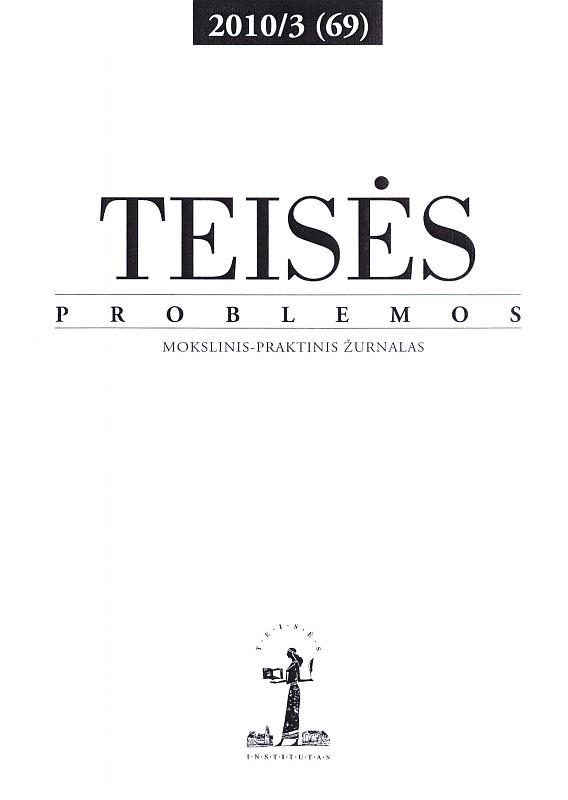Europos Sąjungos teisėkūra ir kitos teisės aktų leidybos procedūros
Legislative Procedure and Other Procedures for Adoption of Normative Legal Acts in European Union
Author(s): Petras RagauskasSubject(s): Law, Constitution, Jurisprudence, EU-Legislation
Published by: Lietuvos teisės institutas
Summary/Abstract: The Lisbon Treaty provides quite a number of novelties in the legislation of the European Union. These novelties have already been considered in the Treaty establishing the Constitution of Europe (which never entered into force), considering the principle aims relating law creation thereof as the democratization and reformation of the system which was held as too much complicated. Unfortunately, due to the synthesis of two referred aims, the “traffic” of the reconstruction (not for the first time already, as much as the complexity of the former law making procedure was conditioned by the enhancing of powers, in several stages, of the European Parliament in order to ensure the democratic mandate of the adopted decisions) have moved towards two different directions: the involvement of national parliaments intended to increase the democracy of law making process, having simplifying effect in some aspects, at the same time makes the procedure lumpish. Consequently, the final result is that the mechanism of law making renders changed, the number of procedures reduced, however, the content thereof have become even more complicated. Besides the fact, that the simplification of the procedures is not very significant, the decision which may be of greater importance in future is the division of legislative and non-legislative acts (and also of legislative process and of non-legislative process). Unfortunately, the notion of the legislative acts in material sense is still unclear. Legislation is detached in formal sense only, and the specified features thereof relate participants only, and not the content of acts. However, this distinction creates possibilities for the hereafter uprise of material segregation (most probably throughout the case law of the Court of Justice), more precise conception of legislative acts and post-legislative acts. The truth is that the role of the national parliaments of the Member States and the European Parliament has become important as never before. In this sense, the achievements of these institutions having most democratic mandate are manifest (however, only future and specific researches will show whether it can be called achievements in the sense of efficiency of law making). One more reservation should be made – it is unclear, in what extent national parliaments will be willing to use their new powers. However, taking into account the variety (twenty seven states with different traditions, history, mentality, needs, and, finally, attitude towards the need of the EU dimension) there shall certainly be some national parliaments, which will use the newly granted powers more actively than others. Undoubtedly, the European Parliament will use the new powers (as it was actively seeking to achieve them). To conclude the undergone changes and the new system, it is difficult to hide disappointment, as clarity and simplicity in the legislation of European Union was lacking, is still lacking and will not appear in the nearest future (if it is still possible, seeking to satisfy the need for harmonisation of national and common interests and for the reduction of tension relating the democracy gap). The amendments of the Lisbon Treaty have created a number of novelties; however, most of them are not substantial. As a symptomatic example for the illustration of this summing-up it would be proper to mention the establishment of the institute of the citizens’ initiative in European legislation, as a measure for expression of the EU democracy. Unfortunately, it is unlikely that this institute even potentially may operate and become more than a symbol or sham. However, the collection of a million signatures of citizens is a serious task. Moreover, it must be evaluated that the initiative is not complete and it will not bind even the Commission (i.e. practically, the draft act may never be submitted for consideration), therefore the significance of it will always rise many pragmatic questions. It is likely that only political parties will have real abilities to collect such number of signatures in the EU dimension. However, they will undoubtedly find other ways to initiate a draft act in a quicker and cheaper manner.
Journal: Teisės problemos
- Issue Year: 2010
- Issue No: 69 (3)
- Page Range: 5-94
- Page Count: 90
- Language: Lithuanian

